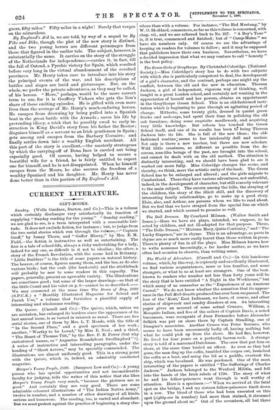The Green Girls of Greythorpe. By Christabel Coleridge. (National Society.)
—Miss Coleridge's story has to do with two subjects with which she is particularly competent to deal, the development of a girl's character, and the contrast, perhaps one might say the conflict, between the old and the new in education. Theresa Jackson, a girl of independent, vigorous way of thinking, well
taught in a great London school, and certainly not wanting in the appreciation of herself and her powers, obtains an appointment in the Greythorpe Green School. This is an old-fashioned insti- tution which is beginning to pass through an agitating period of change. Hitherto, some twenty girls, dressed in quaint green frocks and mob-caps, had spent their time in polishing the old oak furniture, doing some exquisite needlework, and acquiring very little knowledge. But reform has touched the Green School itself, and one of its results has been a bring Theresa Jackson into its life. She is full of the new ideas ; the old- fashioned routine: seems to her intolerably dull and useless. Not only is there a new teacher, but there are new scholars Wild little creatures, as different as possible from the de- corous, nun-like beings of the past, are brought into the school, and cannot be dealt with on the old method. The situation is distinctly interesting, and we should have been glad to see it worked out more fully. Miss Coleridge changes the scene, and thereby, we think, mars the artistic unity of the book. The Green School has to be enlarged and altered ; and the girls migrate to Cumberland. There they have various adventures, not unfruitful, indeed, in the development of character, but still scarcely relevant to the main subject. The cavern among the hills, the straying of the children, the story of the illicit still, and the discovery of interesting family relationships, go to make up a good story. Elsie, also, and Arthur, are persons whom we like to read about. But we feel that we have strayed from the special line on which we started, and which seemed to promise so well.


















































 Previous page
Previous page